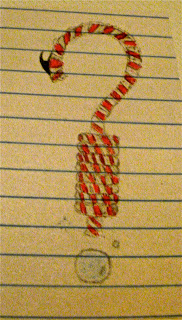Hello all, and Happy Thanksgiving to everything. I find it rather curious that we have as a nation designated one day to be thankful for a plethora of things when it only takes a moment each day to meditate on what you have and to give thanks to whatever circumstantial entity has gifted you with it (God, fate, luck, etc.). The very fact that we are conscious creatures, able to experience this existence, all its pains and pleasures, tears and smiles, is a miracle. My challenge to each of you is for the next week, just take one moment each day to reflect on all the things you have been blessed with in this life. That can be your gift to me.
Anyhow, we have a considerably long poem in this post. The rhyme-scheme per stanza is sort of wonky (ABCDABCD-EE-FFGHHG-II), but I enjoy playing around with rhyme-scheme to see how thier affect changes. The name is a Japanese term for a Buddhist concept that says that all worldly things are transitory and impermanent. The poem tells the fictional story of a girl with thorns for hair who wanders around an arid world and, well... I'll just let you read on. I'm very proud of this piece and I hope everyone enjoys reading it as much as I did writing it.
Shogyoumujou
Locks of thorns
The sharpest type
As long as limbs
That proliferated
Curled and scorn
That made it hard to bite
Without scaring the lips
They lacerated
Naked as the earth on which she walked
Never knew another soul, and as such, never talked
The sun seared
For three hundred years
And yet her skin remained as white as a lotus
Her fingers bled
From running them through her hair
However she remained too mesmerized to notice
For her eyes had been bleached every color ever known
And with each sweltering day that passed her compassion had grown
Just beneath the thin flesh she wore
Pulsed a massive heart
That had pushed all the other components aside
To make room to beat
It had sieved away her ability to abhor
And left nothing but perfection wrought
And of that space that remained inside
Scuttled a rhythm that was erratically sweet
Abusive, elusive and catatonic
Loquacious, gracious, and cacophonic
It was all of sound she understood
And she danced and hummed as anyone would
To the music of the celestial organ
Swooning with every step she took
Chills she attained, under goose bumps she shook
Barbs were to her as snakes were to the gorgon
Tears rolled down her cheeks, overcome by a mercurial bliss
That can only faintly be challenged by the taste of a kiss
Until inexplicably
On the eve of a storm
Lightning struck at her feet
Before the sun was consumed
Hitherto cyclically
As all things in the universe conform
On this eve she would meet
The perpetuator of why flowers bloom
Within the matter of several decades
The rain thereupon began to cascade
Dousing her in a strange sensation
Far beyond her instigation
She bathed for the very first time
She danced as lightning struck the ground
And thunder abounded all around
Giving plot to her idyllic mime
Her chest tightened and made every breath a cherished one
As the sky continued to hiss, spit and fire like a gun
She fell onto her knees
Anguish sprayed across her face
Yet a smile painted her all the more
A glistening nirvana shone in her eyes
Her lips refused to bleed
Her fingers no longer grazed
 Her muscles flexed and nearly tore
Her muscles flexed and nearly toreAs she screamed back at the sky
Her gauzy flesh was a window now
To her veins within, splaying out
They twitched and flickered
As she cricked and snickered
Her heartbeat fighting against the roar of the squall
Her organs contorted
To the bone she resorted
As her tongue seemed to cramp into a great knotted ball
The tumult, the torment, the torturous ecstasy
The gamut, the gambit, the ungodly euphony
With a surge of expurgation, her wrists tore open
And the veins and capillaries from within were freed
They flailed like feeble tentacles
Slashing at the brainsick ether
Tears continued to roil, but in her eyes they were a heavenly token
Her tubular extensions groped the ground, as if reaching to lay their seed
It was the most wondrous of wonderful spectacles
The lightning stopped, as if it knew it was too late to reach her
She fell further into her stupor and heap
As she laughed wildly and continued to weep
The veins in her back, chest and face,
From her legs too, unraveled in a horrendous embrace
They stretched toward the cold, coral colored earth
Her voice cracked and ceased as her tears stopped flowing
The clouds seemed to thin, the wind eased its blowing
The only disturbance then was her still beating heart in the forsaken mirth
The capillaries were like root hairs, the veins burrowed further
As the heart was revealed, still enraptured in fervor
Her fists still clutched muddy soil
Her ribcage fanned outward and dipped in the mire
As the spider webbing of internal transit
Pulled the heart downward bellow the sand
Thunder cracked above the blue and red toil
As the coiled capillaries fidgeted and perspired
Only the ragged and tattered skin on the surface now sits
Limp and monotonous, in lumps, ribbons and strands
The zephyr had cleared and the sun still endured
Yet no life now existed for it to scorn
Then came with a burst and a drivel anonymous
A strange noise that was secular and autonomous
The unresponsive husk flinched and showed a dim glimmer of survival
It jumped and frisked, and made some attempt
Gave indication of life hence no longer preempt
But within moments that assumption was naught, for the body was desecrated by a
new arrival
The once pale and flawless flesh shattered into dust
And where it had fallen stood a magnificent tree, arborous


















